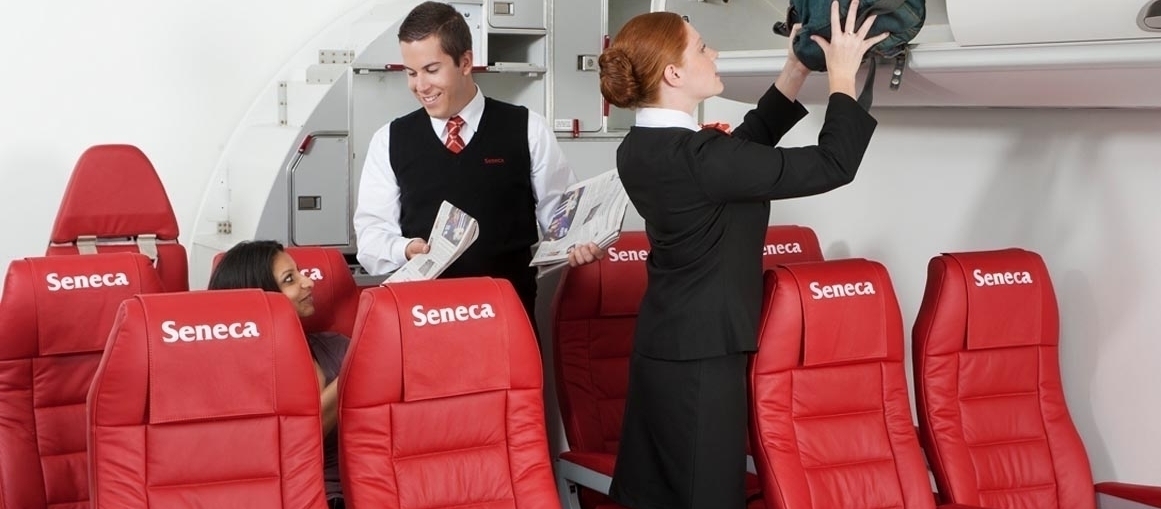At Seneca, we are here to support you as you make the transition to study and live in Canada. Securing housing is a key part of your journey abroad. We provide you with accommodation options that will make you feel at home. Depending on your needs and preferences, you can choose between on- or off-campus housing.
Housing
On-campus Housing
Living on campus gives you the full college experience and can help ease your transition to Canada. Seneca's apartment-style residence buildings at King and Newnham campuses are accessible and fully equipped. Organized social activites will also help you to meet your peers and foster friendships.
Living on residence removes the need to commute, meaning you will have access to on-campus resources, and freeing your time to focus on your studies while enjoying the student community in a safe and convenient environment.
Some of the amenities at Seneca Residence includes:
- 24-hour monitored building
Private bedroom, with a shared three-piece washroom and a kitchenette that is equipped with a fridge, microwave and preparation area
Spacious suites, and each private bedroom comes furnished with a double bed, closet, dresser, desk, chair, 32-inch smart TV and internet
Heat, hydro, and water costs included
Choose to live near people who share similar interests both academically and socially
A variety of leadership and volunteer opportunities
24-hour access to a common kitchen
Access to more than 15 different lounges, including games rooms, study lounges, and a cardio room
Seneca Newnham Residence accepts students from every Seneca Campus. You will have convenient access to Seneca’s free intercampus shuttle service which travels between Newnham, Markham, Seneca@York and King campuses. For more information, visit senecaresidence.ca.
Off-campus Housing
Search current student housing listings through Seneca’s trusted partner, Places4Students. This extensive real-time database will help you find vacancies located near Seneca campuses. Listings include photos, contact information and property features. Ensure that terms of your living arrangements are outlined in a signed lease.
Homestay
Canada Homestay Network (CHN) manages homestay accommodations for international students at Seneca. Through a CHN homestay, students reside with an approved host and become integrated members of the family and community. Homestays are available for a minimum one-month period.
All accommodations include, at a minimum:
- a furnished room with a window
- a bed with clean linen (sheets, pillow, and blankets)
- private storage for your belongings (such as a chest of drawers or a closet)
- access to a shared bathroom with your own clean towels
- a quiet place to study, usually in your own room
For more details, visit Canada Homestay Network’s website.
Accommodation options include various meal plan and accommodation options.
Apply by submitting an International Student Homestay Application to CHN. Payment is made directly through CHN.
Deciding Where to Live – Things to Consider
When looking for a place to live, think about your needs, your preferences and your values. There are many things you may wish to consider when evaluating where to live.
Seneca campuses are located throughout the Greater Toronto area and are accesible by public transit.
If you decide to live in a shared house or apartment, you will need to carefully consider what type of people you are comfortable living with.
- Make sure your expectations align and that your lifestyles are compatible
- Determine how important responsibilities will be shared
- Sign a roommate agreement
Basement suite
- There may be noise from above
- Usually below-ground
- Limited natural light due to little or no windows
Apartments and Condominiums — low-rise and high-rise
- Choose from low-rise (four floors or less), mid-rise (between five to 12 floors) or high-rise (13 floors or more) buildings
- Units come in several different configurations such as a bachelor (no dedicated bedroom) or with one or more bedrooms
- Consider whether the building has an elevator(s) and if it meets accessibility needs
- Consider whether the building has on-site security
House — entire house or a unit within a house
- Leasing an entire house or a unit within a house is different than renting a room
- Consider which spaces are private versus shared with the owner and/or other tenants
- Consider who is responsible for general maintenance
Homestay
- When you choose a homestay, you become a member of the family you live with and a part of the community you live in. Learn more about homestay
To study or work at Seneca, you have to get here first. Public transit is a great option for all Seneca campuses. When looking for off-campus housing consider:
- Is it within walking distance to public transit?
- How long will it take you to travel to campus using public transit?
- Will you need to take more than one bus? Note: Bus transfers adds time to your commute and can be frustrating if you miss a connection.
- How frequently do buses run and how busy are the bus routes?
- Is cheaper rent worth a longer commute?
Remember, Seneca’s Campus Shuttle provides transportation between four campuses.
You want to ensure you choose a neighbourhood and living situation that fits your needs and complements your lifestyle:
- Are you okay with noise from other students, young families with children, or busy traffic?
- Consider your own habits and noise. Do you think your new neighbours will be okay with noise coming from your place?
Canada has four seasons throughout the year: winter, spring, summer and fall.
Winter officially runs from Dec. 21 to March 19. During this time, the days are short, and it can get very cold and snowy. It is possible that we get snow as early as November.
- Do you mind biking or walking to campus or other places around Toronto during inclement weather?
- Is it worth more expensive rent to live within minutes of transit and amenities?
- Will your landlord be responsible for snow removal?
Dining habits
- Do you prefer cooking or eating out?
- Is there a grocery store located in close proximity? If not, do you have access to a car or transit to get to the grocery store?
Furniture
- How much furniture will you need?
- How will you move in new furniture?
- Furnished apartments often make sense for students looking for short-term housing
Laundry:
- Most apartment buildings have shared laundry rooms with pay-for-use washers and dryers
- Basement suites and houses may or may not have a washer/dryer
- Where is the closest laundromat?
Utilities refer to heat, internet and cable:
- Can you control your own thermostat?
- Does internet quality matter to you?
- What utilities are included in your lease?
Rents vary greatly depending on location within the Greater Toronto Area, age, and housing types.
The following chart provides an estimate:
Unit Size |
Average Monthly Market Rent |
|---|---|
Bachelor apartment |
$1,225 |
One bedroom apartment |
$1,446 |
Source: City of Toronto Average Market Rentals
You may need to consider additional costs such as:
- utilities
- renters insurance
- internet
- security deposit
- laundry
- parking and/or public transit
- Inspection
Make sure that you’re getting all you were promised. Before signing a lease, inspect the unit (or have someone you trust inspect it for you). - Deposit and documentation
- Obtain a copy of your rental agreement. If any other terms are discussed, get them in writing.
- Take photos to document any existing damage or repairs needed before you move in
- Obtain proof of payment. Pay by cheque or money order, or get a receipt if you pay in cash.
- Set up utilities
Most tenants need to set up electricity, TV, internet and other utilities independently. View the Life in Canada video for an introduction to living in Canada and resources to help you get settled.
Contact
For general inquiries, contact our International Student Services office.



